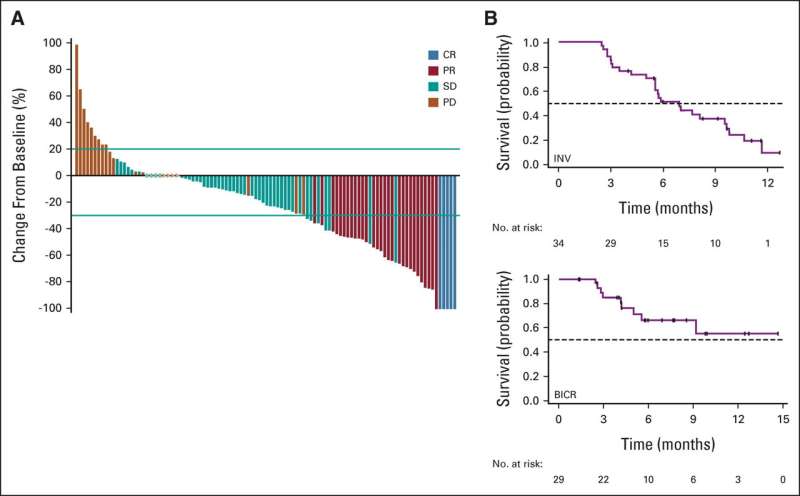This article has been reviewed according to Science X's editorial process and policies. Editors have highlighted the following attributes while ensuring the content's credibility:
fact-checked
peer-reviewed publication
trusted source
proofread
Study results show conjugate therapy produced remissions in one-third of patients with drug-resistant ovarian cancer

In an internationally conducted clinical trial lead by Dana-Farber involving patients with recurrent ovarian cancer that is resistant to platinum therapy, a novel conjugate therapy called mirvetuximab soravtansine resulted in substantially better responses than standard treatments. Mirvetuximab soravtansine was granted accelerated approval by the U.S. Food and Drug Administration (FDA) in November 2022.
The FDA approval was based on results of the SORAYA study, which were published on January 30 in the Journal of Clinical Oncology and were previously reported at the Society for Gynecologic Oncology annual meeting in March 2022 and the Annual American Society of Clinical Oncology meeting in June 2022.
"The results of the SORAYA study supported the accelerated FDA approval of mirvetuximab for patients with recurrent, platinum-resistant, folate receptor alpha-positive ovarian cancer," Ursula A. Matulonis, MD, chief of the Division of Gynecologic Oncology at Dana-Farber, lead author and co-principal investigator of the study.
"The recent approval of this agent by the FDA makes it the first approved therapy for platinum resistant ovarian cancer since 2014, and the findings we report today in the Journal of Clinical Oncology underscore the benefit of mirvetuximab soravtansine for this patient population."
The study enrolled 106 patients with platinum-resistant high-grade serous ovarian cancer that highly expressed folate receptor alpha. The participants had been treated with up to three prior treatments for their ovarian cancer.
The study results show that after a median follow-up of 13.4 months, 32.4% of participants had an objective anti-cancer response, including five who had a complete response, or the disappearance of all signs of cancer. The median duration of response was 6.9 months.
Importantly, drug activity was observed irrespective of the number of previous lines of therapy received or PARP inhibitor exposure in patients having received prior bevacizumab. Mirvetuximab was well-tolerated by study participants. The most common adverse side effects associated with the treatment were blurred vision, keratopathy (a non-inflammatory condition of the eye), and nausea.
The novel agent is one of a growing number of antibody-drug conjugates, or ADCs, which consist of a drug linked to an antibody that directly targets the cancer cell. Mirvetuximab connects an antibody targeting the folate receptor alpha molecule on high-grade serous ovarian cancers to a drug molecule called DM4 that disrupts microtubule formation. (Microtubules are major components of the cytoskeleton that give shape and structure to cells.) The folate receptor protein is far more abundant in some tumor cells than normal cells, making it an attractive target for cancer drugs.
More information: Ursula A. Matulonis et al, Efficacy and Safety of Mirvetuximab Soravtansine in Patients With Platinum-Resistant Ovarian Cancer With High Folate Receptor Alpha Expression: Results From the SORAYA Study, Journal of Clinical Oncology (2023). DOI: 10.1200/JCO.22.01900




















